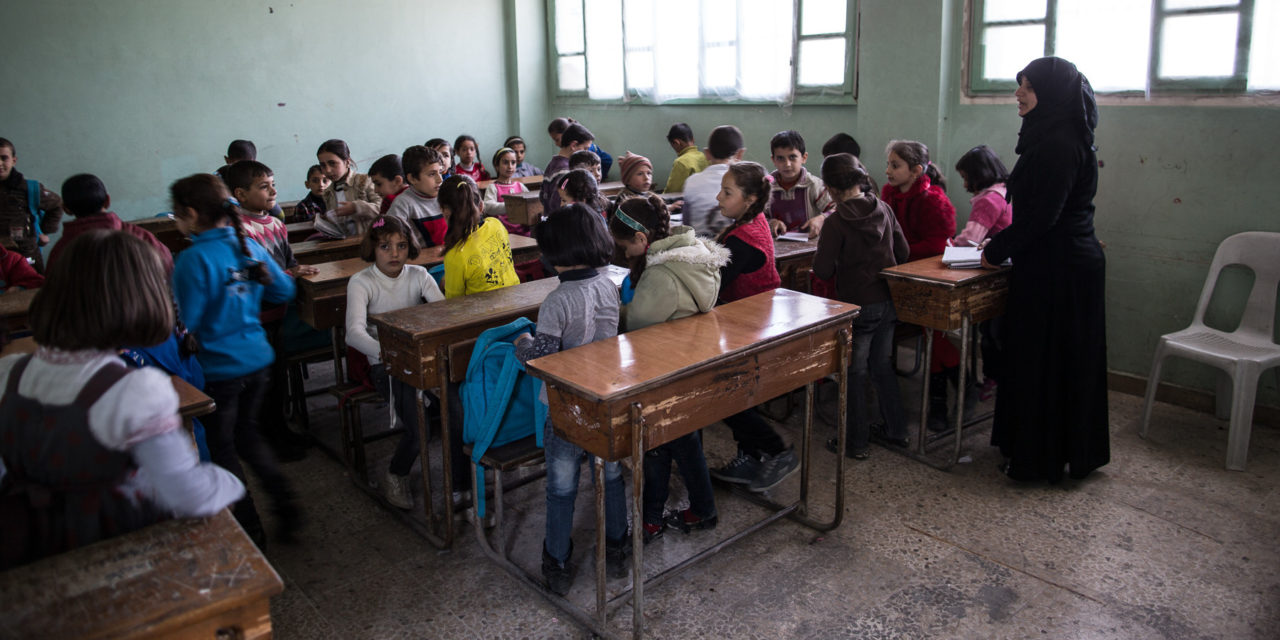PHOTO: A teacher leads an English class in Maarat al-Numan, Idlib Province, April 6, 2014
Teachers who work in opposition-held Idlib Province are still paid by the Assad regime.
However, there is a risky catch to the arrangement. To collect a salary of about $165 per month, the teachers have to travel south to a regime-controlled part of Hama Province, a journey which can take up to five hours and passes through dozens of checkpoints.
One teacher, Waleed, describes the situation to Syria Direct’s Bahira al-Zarier and Sarah Abaid:
You’re a teacher who lives and works in opposition territory. When you cross into regime territory and pass through checkpoints in order to receive your salary, are you afraid you will get arrested?
Yes, I’m afraid. The potential death I face while traveling on this road has a different taste than death by shelling or an explosion. I endure psychological torture as well, because I never know what will happen.
Every month, before I leave for Hama, I tell my wife and children goodbye. I worry that this is the last time I’ll see them because I’ll get arrested, or die.
I’m always afraid a soldier will stop me at a checkpoint and tell me that I’m wanted by the regime. I’m scared because the regime has informants in every liberated area.
The road is very dangerous. Whenever soldiers stop me to conduct a search, I can tell by their looks that they regard me as an enemy. It’s like I’m walking through a forest of wild beasts, trying to find my way to safety. The soldiers are just waiting for me to slip and say something so they can take revenge on me.
But I have to do this, so I can feed my children. I don’t have another option.
Talk more about the journey into regime territory.
The trip to Hama takes five hours to get through because I have to pass through about 30 regime checkpoints. Before the war, it took 80 minutes. I usually go by bus, which costs SP14,000 ($66), almost half my monthly salary. Once I arrive in Hama, the lines at the Education Directorate are long.
When it’s my turn to receive my salary, I’m terrified that the accountant will refer me to the regime’s security branch first. This would mean that I’m wanted for something.
On my way out of Hama, I’ve seen soldiers prevent teachers who are originally from Hama from leaving the city. I also have to worry about soldiers stealing my salary at the checkpoints.
Have you ever been harassed or treated badly at a checkpoint, since you are coming from opposition territory?
Not just once, but many times. There’s one day in particular that I’ll never be able to forget.
That day, four other teachers and I drove a private car to Hama and split expenses between us. When we stopped at a checkpoint, a soldier placed his hand on the window of the car and told his fellow soldier, “What do you think of these filthy teachers who are using our curriculum?”
We fell silent and didn’t say anything in response. The soldier looked at us and said, “You look like you have a problem with something.”
Then he ordered us to get out of the car and strip naked. We had to stand there for an hour, in clear view of every car that passed through the checkpoint. For those sixty minutes, we wished for death, which would have been easier than this situation. We hoped that this would never happen again.
This soldier insulted our dignity, the only thing we have left after losing our nation and our homes. But we will retain our honor and dignity, no matter what this soldier or anyone else does.
Do you have to bribe soldiers at the checkpoints?
Of course, we have to pay soldiers part of our salaries in order to pass through checkpoints. We’re always harassed and soldiers conduct extremely close searches.
One time, a friend and I were on our way back to Idlib after getting our salaries. At the very last checkpoint before Idlib, a soldier stopped my friend.
The soldier told him, “I heard you’re applying for a position with the Coalition government. And yet, you’re still taking a salary from the Syrian government as a teacher.”
Then he told my friend, “Give me all of your money or I’ll transfer you to the security branch to get interrogated and I’ll take everything else you have.”
Soldiers at previous checkpoints had already taken money from my friend, but there was nothing he could do. So he handed over the rest of his money, losing what he had left to sustain his family.

